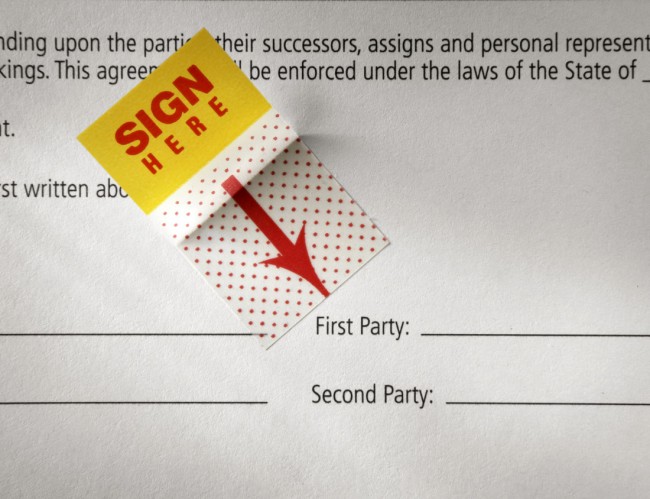Show posts for: Breach of Contract
-
 Read more
Read moreWhen an employer changes its contract with an employee, the change should be communicated clearly—and preferably, in writing. Otherwise, the employer may be at risk of finding that the old terms still control.
For example, last week in Balding v. Sunbelt Steel Texas, Inc., No. 16-4095 (10th Cir. Mar. 13, 2018), a federal court of appeals ruled that an employer had to go to trial over a salesman’s claim for unpaid commissions.
-
 Read more
Read moreA party seeking to enforce a contract has to show mutual assent, also referred to as “a meeting of the minds.” In other words, both parties actually have to agree on the same thing. If the parties don’t agree, then a contract does not exist.
In a recent case, T3 Motion, Inc. (a Segway competitor) used a lack of mutual assent to avoid arbitration of its claims against its former CEO, William Tsumpes. This posture was somewhat unusual - typically, employers try to enforce arbitration agreements, and employees try to avoid them so that they can present their claims publicly in court, before a jury of their peers.
-
 Read more
Read moreIn 2011, a group of executives left Horizon Health Corporation for a competitor, Acadia, but they didn’t leave everything behind. Horizon’s president took a “massive, massive amount” of Horizon documents with him on an external hard drive. And despite provisions in their contracts prohibiting them from soliciting Horizon’s employees, the executives recruited a key member of Horizon’s sales team, John Piechocki, who copied lists of sales leads and added them to his new company’s “master contact list.”
-
 Read more
Read moreWhen employees and employers are approaching the end of an employment relationship, they should consider their existing rights and how their conduct may impact those rights. A recent decision from the Minnesota Court of Appeals demonstrates how one hasty email can change everything.
Beginning on January 1, 2010, LifeSpan of Minnesota, Inc. employed the plaintiff in the case, Mark Sharockman, as its chief financial officer and executive vice president. Mr. Sharockman’s three-year employment agreement with LifeSpan provided, among other things, that he would receive annual pay increases that were at least equal to the average pay increases granted to the other two executive officers.
-
 Read more
Read moreWhen an executive has an employment agreement and his company doesn’t pay, the company might offer a number of excuses based on contract law. One of these contractual defenses is called “impossibility of performance.” Under this defense, when a party enters into a contract and circumstances later change such that the party can’t perform it, the party can be excused from performing.
The Virginia Supreme Court’s recent decision in Hampton Roads Bankshares, Inc. v. Harvard provides a timely example of how this defense actually works in practice. In the Hampton Roads case, the organization established a relationship with government regulators that affected its ability to pay severance. The court held that this change made it impossible for the company to perform an employment agreement, excusing performance.
-
 Read more
Read moreWe’ve counted down our top posts from 2015, from American Apparel to Dr. Robert Schuller. Now, we look at the issues in executive disputes that are likely to draw the most attention in 2016.
-
 Read more
Read moreThe turn of the calendar is always a good time to reflect on what has come before and preview what lies ahead. In this post, we count down our most popular posts of 2015 about executive disputes. Later, we’ll look at what to expect in 2016.
-
 Read more
Read moreWhen the 2015 college football season started, Steve Sarkisian was a rising star in the coaching firmament. He had led the University of Washington Huskies and his current team, the University of Southern California Trojans, to winning records and bowl games.
In late August, however, reports surfaced that Sarkisian had behaved inappropriately at a booster event, the Salute to Troy. And by mid-October, USC had terminated Sarkisian “for cause,” with athletic director Pat Haden explaining that Sarkisian’s use of alcohol had impaired his performance of his job.
This week, Sarkisian struck back, filing a 14-count complaint against USC in Los Angeles Superior Court.
-
 Read more
Read moreIt’s an obvious best practice to put the terms of an employment agreement in writing. Equally obvious is the notion that the writing should be complete, whether in a single document or with reference to other items, such as employee manuals or company-wide incentive plans.
However, it’s not always obvious which documents make up an employment agreement.
Consider the recent decision issued by the United States District Court for the District of California in the case of Lenk v. Monolithic Power Systems, Inc.
-
 Read more
Read moreA contract between an executive and an employer does not always have to be in writing.
Sometimes, employees can enforce oral promises. Agreements can also be implied based on the parties’ conduct, even when no one made a promise, either in writing or orally.
But contracts that aren’t in writing can be much harder to enforce, as the Third Circuit’s recent decision in Steudtner v. Duane Reade, Inc. shows.
As the regulatory and business environments in which our clients operate grow increasingly complex, we identify and offer perspectives on significant legal developments affecting businesses, organizations, and individuals. Each post aims to address timely issues and trends by evaluating impactful decisions, sharing observations of key enforcement changes, or distilling best practices drawn from experience. InsightZS also features personal interest pieces about the impact of our legal work in our communities and about associate life at Zuckerman Spaeder.
Information provided on InsightZS should not be considered legal advice and expressed views are those of the authors alone. Readers should seek specific legal guidance before acting in any particular circumstance.
Contributing Editors

John J. Connolly
Partner
Email | +1 410.949.1149

Andrew N. Goldfarb
Partner
Email | +1 202.778.1822

Sara Alpert Lawson
Partner
Email | +1 410.949.1181

Nicholas M. DiCarlo
Associate
Email | +1 202.778.1835




